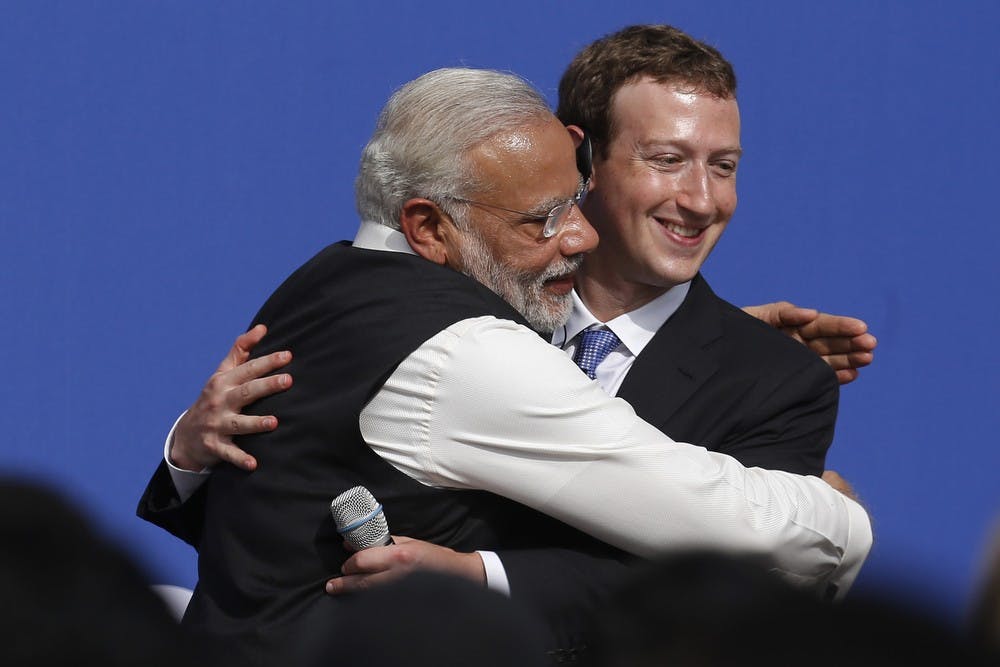Facebook launched the Internet.org initiative in India earlier this year. The stated goal of the mission is to “connect the two thirds of the world that doesn’t have Internet access.”
The project partners with companies and nonprofits to offer free Internet access to people in rural communities with the stipulation that Internet activity is limited to Facebook and a number of other pre-selected sites like AccuWeather, BBC News and Wikipedia, totaling 38 options in all.
Many have heralded the move as a step towards the democratization of the Internet and as being mutually beneficial to all parties. However, there has been stark opposition to Facebook’s program as well.
Some net activists claim that by limiting the sites available, Facebook is creating a pathway for the company's continued dominance of the Internet and that the company is headed down a slippery slope towards violating net neutrality. While the Internet.org initiative is not purely altruistic, the benefits for people unable to access the Internet previously outweigh the cons.
Bringing the issue back into the spotlight, India's Prime Minister Narendra Modi made a trip to the U.S. this weekend. The highlight of his trip was his meeting with Facebook founder and CEO, Mark Zuckerberg, broadcast on TV across India.
The Facebook Townhall had an eclectic mix of questions. Thoroughly enjoyed the interaction. https://t.co/BVEG6w6QLh pic.twitter.com/ZfLtyorb8X
— Narendra Modi (@narendramodi) September 28, 2015
Modi has a large-scale plan to bring greater Internet connectivity to his country, which is outlined in his Digital India initiative. This initiative aims to empower people through the Internet. Facebook wants the country to be more connected in order to ultimately garner more revenue, though it is important to note that Facebook is not currently advertising on its Internet.org version of the site.
Even though both parties may have very different end goals as to why they would like to see India more connected, the two leaders seem to be of the belief that by working together, they are both more likely to achieve their goal.
We are living in an interesting time to see the leader of the world’s largest democracy travel to the U.S. and have the capstone of his trip be his visit with the CEO of a social network, as opposed to a meeting with the President of the United States. In today’s global economy, corporation’s actions are becoming increasingly more intertwined with those of countries, and could begin to require an increased amount of diplomacy in political matters.
Before meeting with Modi, Mark Zuckerberg changed his profile picture to support Digital India, the campaign introduced by Modi, that aims to increase Internet connectivity across the country. Thanking Zuckerberg for his gesture, Modi changed his picture as well.
CardPhoto courtesy (Facebook)
The move was eerily similar to this summer when Facebook launched a photo-editing tool that enabled users to overlay their profile picture with a rainbow flag in anticipation of the U.S. Supreme Court’s ruling on marriage equality. The result was 26 million users turning their digital picture into a declaration of LGBT support and pride.
The irony here is that while Facebook is a steadfast supporter of gay rights, India has laws that not only lack support for LBGT rights, but criminalizes many acts.
For now, it seems that the relationship between India and Facebook is not affected by their differing political views. The partnership can result in increased ability for the people of India to access the web, while also presenting Facebook the opportunity to enhance their global reach.
Related Links:
How Facebook has become too hard to leave, and why that should worry us all
Reach the columnist at benjamin.king.az@gmail.com or follow @benkingaz on Twitter.
Like The State Press on Facebook and follow @statepress on Twitter.
Editor’s note: The opinions presented in this column are the author’s and do not imply any endorsement from The State Press or its editors.
Want to join the conversation? Send an email to opiniondesk.statepress@gmail.com. Keep letters under 300 words and be sure to include your university affiliation. Anonymity will not be granted.




